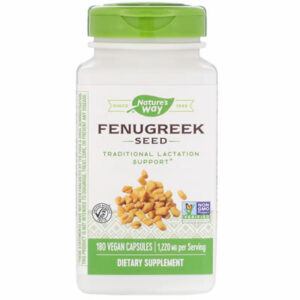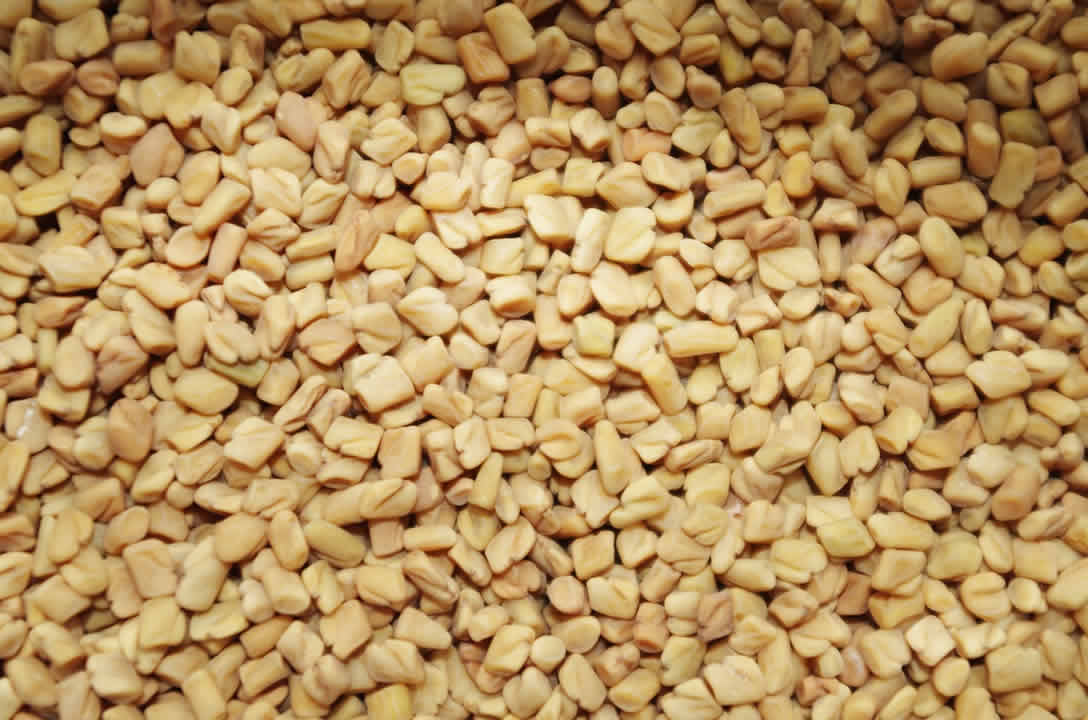Fenugreek is a plant that has both medicinal and edible value. In folk medicine, used to treat various diseases or disorders including diabetes, cancer, hyperlipidemia, inflammation, wounds, bacterial and fungal infections, weakness, and leg edema
What are the benefits of fenugreek supplements? Are there any side effects?
Table of Contents
- What is fenugreek?
- What are the benefits of fenugreek?
- Are there any side effects of fenugreek?
- Safety Precautions
- Where to buy fenugreek recommended by most people?
What is fenugreek?
Fenugreek is an annual legume herb with seeds in the form of clover, native to India and North Africa, and is one of the oldest edible and medicinal plants.
In terms of edible use, it is a well-known seasoning and one of the ingredients of Indian curry. It is also used in cooking dishes such as baking, kimchi, and tea.
Its medicinal parts are mainly dry and mature seeds, which contain a lot of fiber, phospholipids, glycolipids, oleic acid, linolenic acid, linoleic acid, choline, Vitamin A, Vitamin B1, Vitamin B2, Vitamin C, nicotinic acid and other Rare chemical components such as saponin, coumarin, fenugreek, phytic acid, scopolamine, and trigonelline are all considered to be the reasons for fenugreek to have multiple benefits.
What are the benefits of fenugreek?
1. Fenugreek raises testosterone levels
Testosterone, also known as testosterone, is a multi-effect hormone that plays an important role in the human body and affects male reproductive and metabolic functions.
In men, testicular hormone levels gradually increase from adolescence to adulthood, and then decline by 1.6% per year over the age of 40, while the available levels fall by 2% to 3% per year.
Symptoms of low testosterone levels are non-specific and include decreased libido, erectile dysfunction, decreased ejaculation, reduced body, and facial hair, decreased bone density, decreased lean body mass, increased body fat, fatigue, weakness, increased anxiety, and large amounts Sweating and anemia.
A meta-analysis ( including 4 randomized controlled trials with a total of 206 male participants) pointed out that subjects taking fenugreek extract had higher average total testosterone levels compared to the placebo group.
The underlying mechanism may be related to the steroid precursor saponin diosgenin contained in fenugreek seed extract.
*Conclusion: Oral fenugreek seed extract has a positive effect on increasing testosterone levels but is limited by the small sample size and heterogeneity between studies, and more studies are still needed to further verify.
2. Fenugreek lactation increases breast milk (fat milk)
Breastfeeding provides optimal nutrition for newborns and babies while providing immune support and many lifetime health benefits.
According to statistics, there is no risk of breastfeeding or short-term breastfeeding of infants and gastrointestinal, urinary, respiratory and middle ear infections, and a range of non-communicable diseases (such as asthma, allergies, obesity, and diabetes, and some childhood cancers) increase related.
A meta-analysis (including 5 randomized controlled trials) pointed out that the overall analysis showed that fenugreek capsules/fenugreek tea increased breast milk production better than placebo and control groups, but far inferior to the left-hand Incense (Coleus amboinicus) and date palm (Date palm).
*Conclusion: Fenugreek has a very slight effect on increasing breast milk, and is limited by the small sample size and safety concerns. More research is still needed to confirm its clinical benefit.
3. Fenugreek beneficial blood sugar regulation
Diabetes is a popular metabolic disorder that affects 415 million people worldwide. Chronic hyperglycemia is associated with long-term damage, dysfunction, and failure of different organs, especially the eyes, kidneys, nerves, heart, and blood vessels.
In addition, according to the International Diabetes Federation, by 2040, 1 in 10 adults will have diabetes.
A meta-analysis of literature (including 12 randomized controlled trials, a total of 1173 patients with diabetes and pre-diabetes) pointed out that fenugreek can significantly reduce fasting blood glucose (postprandial 2h blood glucose), glycosylated hemoglobin and total cholesterol levels.
In addition, although triglyceride or low-density lipoprotein cholesterol (LDL-C) levels showed a downward trend, HDL-c showed an upward trend, but the magnitude was not statistically significant.
*Conclusion: Fenugreek has a positive effect on blood sugar regulation, but is limited by the small sample size and the low quality of research methods. More research is still needed to further verify.
4. Fenugreek is beneficial for blood lipid regulation
Dyslipidemia refers to the disorder of one or more lipoproteins in the blood, such as increased total cholesterol, low-density lipoprotein cholesterol or triglyceride, or decreased high-density lipoprotein cholesterol levels, which can be treated within 5 years Reduce the risk of heart disease by about 30%.
In many developing countries, the prevalence of dyslipidemia is increasing due to diet westernization, obesity, an aging population, reduced physical activity, and other adverse lifestyle changes.
A systematic literature review and meta-analysis (including 12 randomized controlled trials with a total of 560 participants) pointed out that supplementing fenugreek seed extraction can significantly reduce plasma total cholesterol and triglycerides, low-density lipoprotein cholesterol, and increase high-density lipoprotein cholesterol.
*Conclusion: Supplementing fenugreek seed-related products has a positive effect on the regulation of blood lipids, especially in subjects with abnormal blood lipids, but is limited by the heterogeneity of the included studies and the small number of samples, and more design and accurate studies are still needed to further verify.
5. Fenugreek benefits primary dysmenorrhea
Primary dysmenorrhea refers to dysmenorrhea without any pelvic pathology. It is a common gynecological disease and is estimated to account for 45% to 95% of women of childbearing age.
Current evidence indicates that primary dysmenorrhea is related to the ovulation cycle, mainly due to the contraction of the myometrium caused by excessive endometrial prostaglandin secretion, which mainly occurs 48 hours before menstrual cramps.
A double-blind, randomized, placebo-controlled trial (2 months, 101 patients with moderate to severe primary dysmenorrhea) pointed out that oral fenugreek seed powder capsules can reduce pain.
In addition, systemic symptoms in the fenugreek group include: fatigue, headache, nausea, vomiting, fatigue, and syncope also improved.
*Conclusion: Fenugreek may have a positive effect on the improvement of dysmenorrhea, but it is limited by the small sample size, and more research is needed to corroborate it.
Are there any side effects of fenugreek?
For most healthy adults, moderate use of fenugreek is safe, but the possible side effects or adverse reactions that have been reported include diarrhea, stomach upset, bloating, flatulence, dizziness, headache, and urine with ” “Maple syrup” taste.
Safety Precautions
1. Do not use it for pregnant women. The excessive dose may cause infant deformity and early contractions.
2. Do not use for children (because the relevant safety is unknown).
3. Do not use it if you have been allergic to Fabaceae plants (commonly known as soybeans, peanuts, chickpeas, and green beans), which may induce allergies. Symptoms include stuffy nose, cough, wheezing, facial swelling, shock, etc.
4. Do not use it in patients with diabetes or taking related hypoglycemic drugs, because fenugreek may have blood sugar-regulating effect, the names of related drugs are glimepiride, glyburide, insulin, pioglitazone, rosiglitazone, chlorpropamide, glipizide, tolbutamide.
5. Do not use before delivery, it may cause neonatal body odor similar to maple syrup urine disease.
6. There was a case where a man developed pulmonary embolism or pulmonary thrombosis after taking testosterone enhancers containing fenugreek, but it is unclear whether it is related.
7. Do not use in patients with coagulation dysfunction or taking anticoagulants, because fenugreek may have anticoagulant effects. The names of related drugs are Aspirin, clopidogrel, diclofenac, Ibuprofen, naproxen, dalteparin, enoxaparin, heparin, warfarin.
8. Animal studies indicate that the use of fenugreek seed extract may be related to hypothyroidism. Therefore, patients with thyroid-related diseases are advised to avoid use.
9. The ingredients of fenugreek seeds can be used to have estrogen-like effects, so patients with hormone-sensitive symptoms should avoid it, such as breast fibroma, breast cancer, endometrial cancer, uterine fibroids, endometriosis Location, endometrial hyperplasia, colorectal cancer, ovarian cancer, gynecomastia, precocious puberty in girls, and excessive menstruation.
Where to buy fenugreek recommended by most people?
In recent years, food safety problems in various countries have exploded, and it is not healthy but black-hearted products that everyone spends on. Therefore, European and American products with relatively strict quality control have become popular products.
And iHerb.com is a large-scale medical cosmetics e-commerce company in the United States. It has a high satisfaction rate of 97% in the evaluation of Google customers. It provides global home delivery so that you can buy it without risking buying fakes through purchasing high-quality health products.

